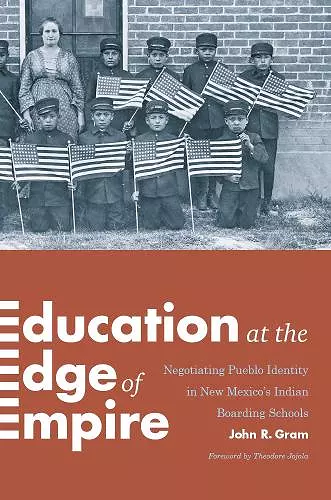Education at the Edge of Empire
Negotiating Pueblo Identity in New Mexico's Indian Boarding Schools
Format:Paperback
Publisher:University of Washington Press
Published:1st Aug '16
Currently unavailable, and unfortunately no date known when it will be back
This paperback is available in another edition too:
- Hardback£35.00(9780295994772)

The Pueblo Indians of New Mexico were more than passive victims in the face of federal efforts to dispossess their children of their cultural identities. With issues of power, culture, and agency at its very center, Education at the Edge of Empire constitutes an important contribution to the literature on Indian boarding schools. -- David Wallace Adams, author of Education for Extinction: American Indians and the Boarding School Experience, 1875-1928 Gram offers a highly engaging account of Pueblo Indian students and their experiences at the Albuquerque and Santa Fe Indian schools. His book reveals an intense power dynamic between parents, school officials, the Catholic church, and the students themselves. No other single scholarly work interrogates the ways Pueblo students and their tribal communities experienced these institutions. -- Matthew Sakiestewa Gilbert, author of Education beyond the Mesas: Hopi Students at Sherman Institute, 1902-1929
For the vast majority of Native American students in federal Indian boarding schools at the turn of the twentieth century, the experience was nothing short of tragic. Dislocated from family and community, they were forced into an educational system that sought to erase their Indian identity as a means of acculturating them to white society. However, as historian John Gram reveals, some Indian communities on the edge of the American frontier had a much different experience—even influencing the type of education their children received.
Shining a spotlight on Pueblo Indians’ interactions with school officials at the Albuquerque and Santa Fe Indian Schools, Gram examines two rare cases of off-reservation schools that were situated near the communities whose children they sought to assimilate. Far from the federal government’s reach and in competition with nearby Catholic schools for students, these Indian boarding school officials were in no position to make demands and instead were forced to pick their cultural battles with nearby Pueblo parents, who visited the schools regularly. As a result, Pueblo Indians were able to exercise their agency, influencing everything from classroom curriculum to school functions. As Gram reveals, they often mitigated the schools’ assimilation efforts and assured the various pueblos’ cultural, social, and economic survival.
Greatly expanding our understanding of the Indian boarding school experience, Education at the Edge of Empire is grounded in previously overlooked archival material and student oral histories. The result is a groundbreaking examination that contributes to Native American, Western, and education histories, as well as to borderland and Southwest studies. It will appeal to anyone interested in knowing how some Native Americans were able to use the typically oppressive boarding school experience to their advantage.
"Scholars interested in Indian boarding schools, particularly as they compare to one another, will learn from this book, as will those who are interested in the intersecting ecologies of colonization and schooling. Gram's book, moreover, illustrates how education, particularly that of children, is a phenomenon that communities hold in a paramount position that need not be contained within the school itself."
-- Andrea Lawrence * History of Education Quarterly *"[N]ot your typical book about Indian schools. . . . Gram demonstrates a deeper complexity of the boarding school experience and its relationship to several dynamically active communities. . . . This book is well researched through multiple collections and draws on the existing scholarship in ways that show a keen intelligence and great synthesis while incorporating rich primary source materials, many of them gathered from the Santa Fe Indian School. It is amazingly approachable, phenomenally thorough, and easily teachable."
-- Brian S. Collier * Western Historical Quarterly *"Gram provides a nuanced view of the power relationship between the Santa Fe and Albuquerque US government boarding schools and the New Mexico Indians these schools served from the 1880s into the 1930s."
* Choice *"[A]ccessible and interesting. . . . Education at the Edge of Empire is a wonderful addition to the literature of off-reservation boarding schools."
-- Andrae Marak * Journal of American History *"This book offers a fascinating and unexpected view of the Indian boarding experience. It is a welcome addition to Native American historiography and should be of interest to anyone who values a deeper understanding of the way in which Pueblo people in New Mexico were able to make an institution dedicated to destroying their way of life work instead for them."
-- Rick Hendricks * Southwestern Historical Quarterly *"The author does well to illustrate the unique and compelling relationship between Pueblo communities of the Southwest and the two boarding schools that served so many of their children, the Albuquerque Indian School (AIS) and the Santa Fe Indian School (SFIS). . . . Gram’s study of AIS and SFIS provides not only a useful addition to the literature on American Indian boarding schools, but a valuable illustration of the limitations of imperial efforts toward Native people in a borderlands setting."
-- John A. Goodwin * American Indian Culture and Research Journal *"Adds new layers of complexity. . . . Gram aptly demonstrates how the nexus of national and local politics provided Pueblo people with opportunities to exact change from school officials. Gram’s development of a political economy of Indian education stands among the most important contributions of this book."
-- Kevin Whalen * Journal of the History of Childhood and YouISBN: 9780295999661
Dimensions: unknown
Weight: 396g
260 pages